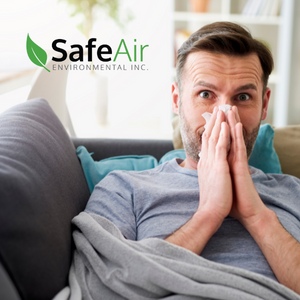How Do You Know if Your Cold is Actually Mold?
Posted in Mold, on August 12, 2022
Most people don’t detect mold visibly at first — it’s a combination of your nose, eyes, and respiratory system where the signs of mold growth first appear. Mold inspection in Toronto is the conclusive way to identify indoor mold growth and improve indoor air quality. Throughout our decade plus of service, the SafeAir team has heard from hundreds of customers about their headaches, itchy eyes, and constant sneezing. They’re looking to improve their indoor air environment to improve these “allergies'' or relieve their “cold and flu” symptoms — without realizing that mold is actually to blame.
How Does Mold Affect Your Indoor Air Quality?
 First, let us tell you how mold negatively affects indoor air quality. Mold grows in environments with an excess of indoor moisture and poor airflow. This is caused by situations (such as showering in a closed bathroom), events like floods or leaks, or the architecture or layout of rooms like the attic or basement.
First, let us tell you how mold negatively affects indoor air quality. Mold grows in environments with an excess of indoor moisture and poor airflow. This is caused by situations (such as showering in a closed bathroom), events like floods or leaks, or the architecture or layout of rooms like the attic or basement.
Mold reproduces by creating tiny spores that float through the air. Unfortunately, these spores cause allergic reactions and health effects ranging from irritating to severe. Mold growth in your home can be a stand-alone problem or indicate more serious indoor air quality issues.
How to Know If Your Cold Symptoms Merit a Mold Inspection in Toronto
In SafeAir’s experience, there are a handful of signs that your cold or flu might be mold growth. If any of the following observations sound like you or your family, it’s time to book a mold inspection in Toronto to rule it out.
- Medication isn’t working: Seeking relief through over-the-counter cold and flu medicines is a great way to reduce the symptoms of a virus, but they generally don’t work or have minimal effect on mold.
- Length of the illness: The average cold runs its course in a week to ten days. If yours lasts longer, it’s probably not a cold! SafeAir recommends testing your indoor air quality and contacting your doctor to explore other causes.
- Skin irritation: Beyond the respiratory system, mold commonly affects people's skin. Our clients have reported experiencing dry skin, rashes, an increase in eczema or psoriasis, as well as other types of dermatitis.
- You’ve recently had water damage: A flood, leak, or water event is one of the primary triggers for mold growth in Toronto. Mold can start to grow as little as 48 hours after water exposure — and moisture can linger in walls or under floors or carpets for many days.
Indoor Air Quality Testing & Mold Inspections Toronto
Allergy-like symptoms can be frustrating, disruptive, and exhausting — all that sneezing! But in the long term, not much is known about how mold growth can affect your health and wellness, and there are already clear links to adverse outcomes for people with respiratory conditions.
An early mold inspection in Toronto can help discover hidden colonies, rule out mold as the culprit, or even find other indoor air quality problems that may mimic the effects of a cold or flu. Get in touch with our team to learn more about SafeAir’s indoor air quality testing services.

